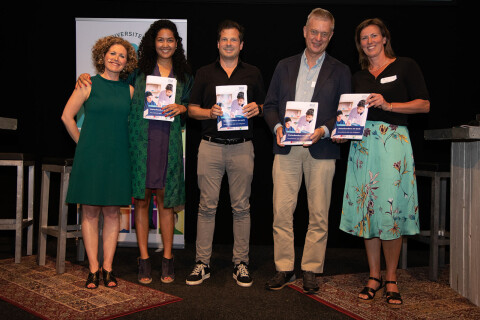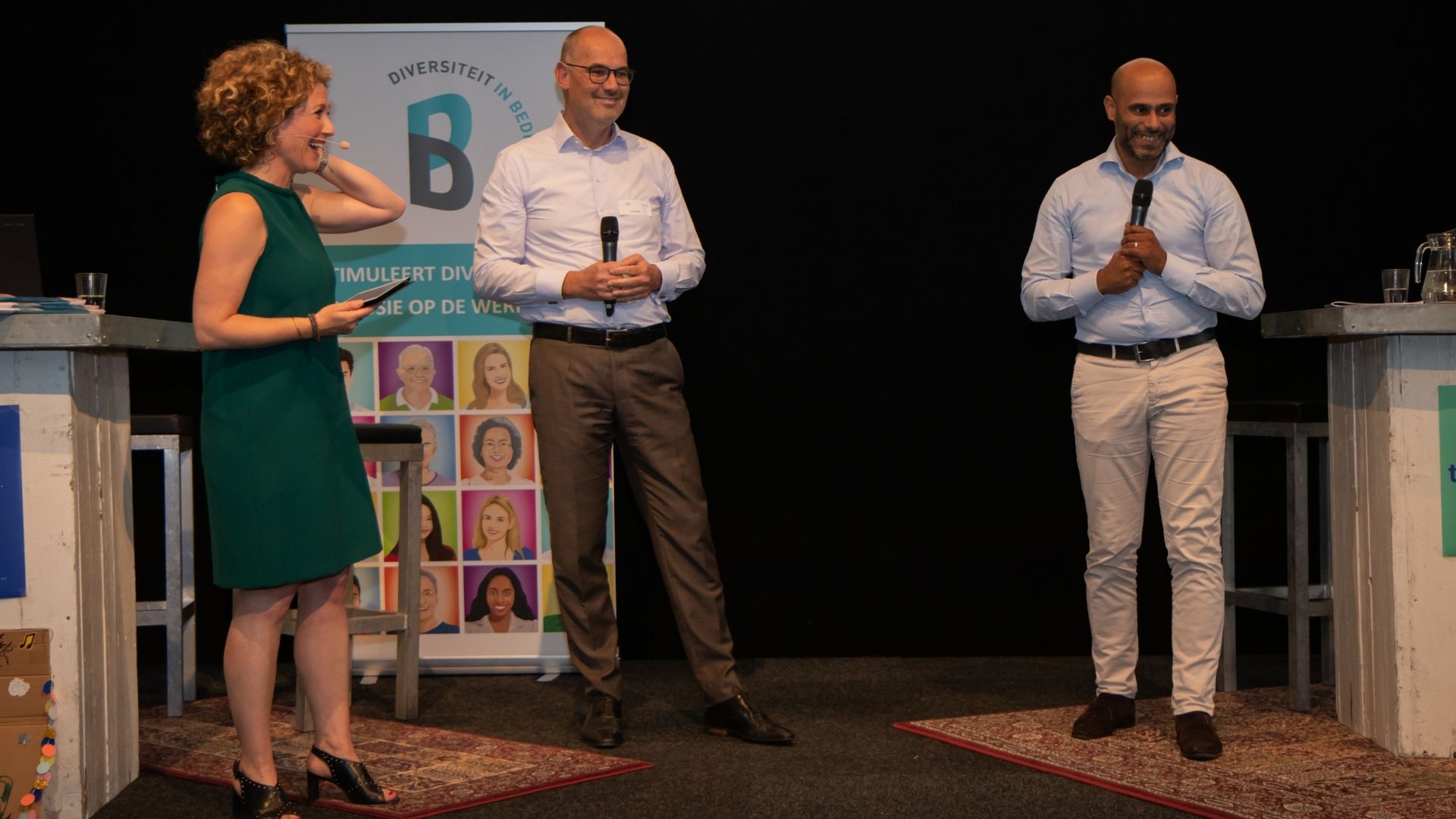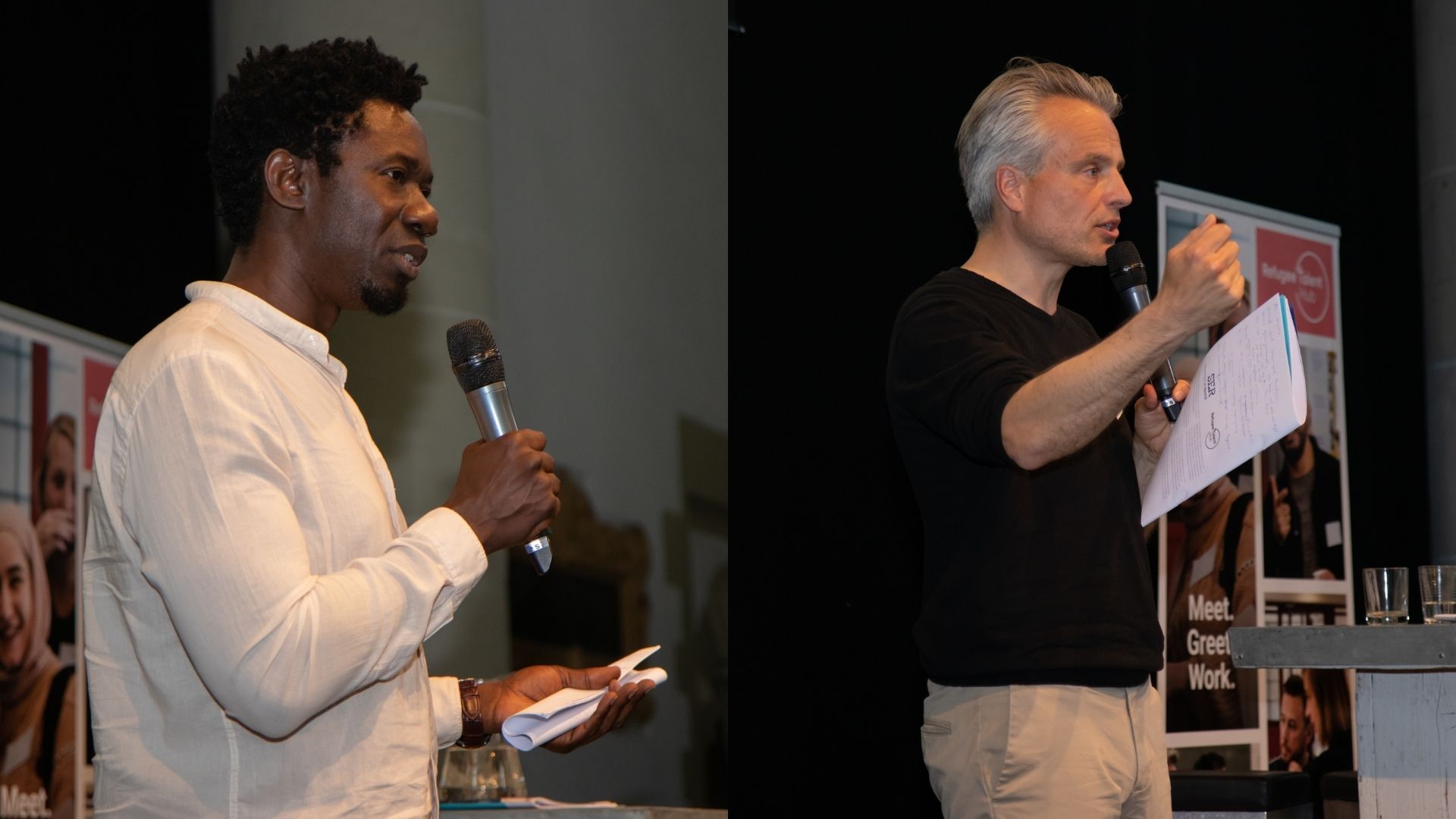
July 7th 2022
SER Diversity in Business and Refugee Talent Hub launch publication Status Holders and Work: 'There is a lot of labor potential here'
On June 30, the Charter Document Status Holders and Work was launched in a packed Zuiderkerk in Amsterdam, a practical guide written and published by SER Diversity in Business and the Refugee Talent Hub. With this publication for employers, the two parties offer insight into the most important points of attention when it comes to working with people with a refugee background.
The topic 'Status holders and work' has been the focus of government, social partners and social organizations for years. Its urgency has only increased with the arrival of new refugees, such as recently due to the war in Ukraine. Both the Refugee Talent Hub and SER Diversity in Business notice that Dutch employers are still missing opportunities when it comes to the inflow and career opportunities of status holders within their company. “There is a lot of labor potential within the group of professionals with a refugee background and there are therefore many opportunities for employers, especially now that they are facing labor shortages,” SER Diversity in Business said in the publication.
Be patient
The program associated with the launch was moderated by Emmelie Zipson. She welcomed the audience and talked about her affinity with the subject. “My ancestors came from countries such as Russia, Poland and Austria. Because of their Jewish roots, they were forced to flee and had to leave everything behind to start all over again in a foreign country. Even though I haven't fled myself, I know their stories. I see that fleeing is timeless.”
As an expert by experience, İlham Atuş was then invited to the stage, a newcomer who is currently doing an internship at Triodos Bank. Atuş had to flee from Turkey after the coup in 2016 and has been living in the Netherlands since 2019. He spoke inspiredly about the hurdles he had to overcome in finding work on the Dutch labor market, such as learning a new language and the pressure he felt from the municipality to find a job. Atuş shared the lessons he learned and made recommendations to employers in the audience. Atuş: 'Think about the long-term value creation of the company. Status holders contribute to this. Therefore, be patient and invest in retaining these professionals.'
Interested in the Charter Document Status Holders and Work? Click on this link for the online version (pdf) .

Resilience and ambition
One of the employers who is committed to supporting status holders is grid operator TenneT. Manon van Beek, CEO and also chairman of the Refugee Talent Hub, has had frequent contact with people with a refugee background in her position in recent years. “These people have incredible resilience and ambition and are good employees for any company,” she says. Her call is therefore to throw unnecessary traditions (such as strict language and diploma requirements in selection procedures) overboard.
The subject was discussed in more depth in two panel discussions. In the first conversation, top people from Sweco and 180 Amsterdam spoke. CEOs Eugene Grüter and Sander Volten shared their experiences and gave employers tips on hiring professionals with a flight background, such as offering mentoring and additional professional language training. The subject of the second panel discussion was the promotion of labor participation of people with a refugee background. Experts Jaco Dagevos (professor of Integration and Migration at Erasmus University Rotterdam) and Mohammed al Temimi (policy advisor at the Municipality of Rotterdam) shed light on the new Integration Act. Compared to the previous law, this places less emphasis on language education and more on labor participation. The law looks good on paper, but according to Dagevos it stands or falls with its implementation.
 In the photo: Emmelie Zipson, Jaco Dagevos and Mohammed al Temimi
In the photo: Emmelie Zipson, Jaco Dagevos and Mohammed al Temimi
Dagevos: “The group of status holders is diverse, which means that their labor participation also requires a tailor-made approach. Research shows time and time again that a generic approach does not work. In addition, policy should focus more on the demand side. In recent years, policy has predominantly focused on characteristics of supply, such as language, social networks and employee skills, with less attention paid to employers and to achieving a match between status holder and employer. Effective policy requires a combination of a supply- and demand-oriented approach. Integration is a two-sided process and policy should pay attention to both sides.”
Al Temimi, who was involved in the implementation of the new Integration Act, also emphasizes that labor participation is the key here. Employers must offer their new employees the opportunity to settle in well. “Concrete example: if an employer offers a status holder a job, he must look at how that job can be cut into pieces. Give someone a little more time to learn the right words and work culture. Integration is a two-sided process, ultimately we all have to do it together. Employers must also be willing to do that little bit extra.”
Labels
Writer and Trouw columnist Babah Tarawally talked about his own experiences in the Netherlands, where he fled in the 1990s because of the war violence in his home country Sierra Leone. It took a long time before people saw him not as a 'refugee', but as a human being and a professional. For example, he once interviewed Johnny de Mol for a major magazine, which he was very proud of. Until the interview appeared under the headline: 'Refugee interviews Johnny de Mol'. Employers need to move away from these labels, says Tarawally, and see newcomers as people with a lot of experience, people skills and skills.
The last speaker, writer and journalist Joris Luyendijk, endorsed the indispensable contribution that status holders can make to the labor market: “They bring with them characteristics and qualities that you do not or hardly find among native Dutch people. First of all, eagerness and perseverance... Such a person will fight for your company or organization, just as he or she has already had to fight to build a whole new life. In addition, world wisdom: today's native Dutch were raised by parents who have not experienced war and lack that life experience. It is really good to have a number of hardened people in your organization. An escape history also means ingenuity, flexibility and knowledge of people and you acquire that on the way to the Netherlands, in the AZC where you are close to each other for years and then during integration.”
Guidance and inclusion
After the program, plenty of contacts were made between employers and job-seeking status holders. The positive energy remained in the Zuiderkerk until the end and all attendees went home with a copy of the Charter Document. The meeting appeared to have had an inspiring effect. “It was a wonderful meeting with a large turnout and a substantively strong program," said Michal van Dantzig (among others, board member of MKB-Amsterdam). "The publication is full of tips, useful when you want to work with highly educated status holders. This is a very interesting group of potential employees. Their talents are often not seen and that is a great shame in these times of scarcity on the labor market. Highly educated status holders are very suitable for retraining for promising professions. I think they are an important target group for SME entrepreneurs.”
The organizers were therefore satisfied. Wilma Roozenboom, director of Refugee Talent Hub: "We look back on a wonderful meeting at which the subject of 'refugees and work' was discussed from many different perspectives. The high number of visitors shows that the subject is alive. We are happy with that. And precisely Because the subject is alive, it is important that there is now a new publication about refugees and work, full of practical examples and tips. Because if more and more employers welcome newcomers to the workplace, let's do it right - with attention to guidance and actual inclusion.”
 In the photo: Babah Tarawally and Joris Luyendijk.
In the photo: Babah Tarawally and Joris Luyendijk.